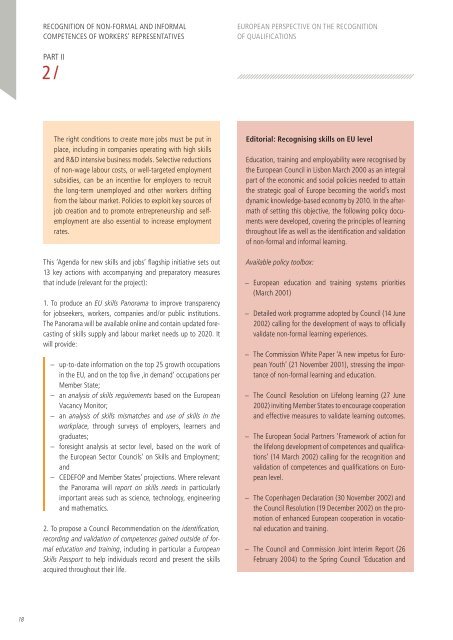RECOGNITION OF NON-FORMAL AND INFORMAL ... - Solidar
RECOGNITION OF NON-FORMAL AND INFORMAL ... - Solidar
RECOGNITION OF NON-FORMAL AND INFORMAL ... - Solidar
You also want an ePaper? Increase the reach of your titles
YUMPU automatically turns print PDFs into web optimized ePapers that Google loves.
<strong>RECOGNITION</strong> <strong>OF</strong> <strong>NON</strong>-<strong>FORMAL</strong> <strong>AND</strong> IN<strong>FORMAL</strong><br />
COMPETENCES <strong>OF</strong> WORKERS’ REPRESENTATIVES<br />
EUROPEAN PERSPECTIVE ON THE <strong>RECOGNITION</strong><br />
<strong>OF</strong> QUALIFICATIONS<br />
PART II<br />
2 /<br />
The right conditions to create more jobs must be put in<br />
place, including in companies operating with high skills<br />
and R&D intensive business models. Selective reductions<br />
of non-wage labour costs, or well-targeted employment<br />
subsidies, can be an incentive for employers to recruit<br />
the long-term unemployed and other workers drifting<br />
from the labour market. Policies to exploit key sources of<br />
job creation and to promote entrepreneurship and selfemployment<br />
are also essential to increase employment<br />
rates.<br />
This ‘Agenda for new skills and jobs’ fl agship initiative sets out<br />
13 key actions with accompanying and preparatory measures<br />
that include (relevant for the project):<br />
1. To produce an EU skills Panorama to improve transparency<br />
for jobseekers, workers, companies and/or public institutions.<br />
The Panorama will be available online and contain updated forecasting<br />
of skills supply and labour market needs up to 2020. It<br />
will provide:<br />
– up-to-date information on the top 25 growth occupations<br />
in the EU, and on the top fi ve ‚in demand‘ occupations per<br />
Member State;<br />
– an analysis of skills requirements based on the European<br />
Vacancy Monitor;<br />
– an analysis of skills mismatches and use of skills in the<br />
workplace, through surveys of employers, learners and<br />
graduates;<br />
– foresight analysis at sector level, based on the work of<br />
the European Sector Councils‘ on Skills and Employment;<br />
and<br />
– CEDEFOP and Member States’ projections. Where relevant<br />
the Panorama will report on skills needs in particularly<br />
important areas such as science, technology, engineering<br />
and mathematics.<br />
2. To propose a Council Recommendation on the identifi cation,<br />
recording and validation of competences gained outside of formal<br />
education and training, including in particular a European<br />
Skills Passport to help individuals record and present the skills<br />
acquired throughout their life.<br />
Editorial: Recognising skills on EU level<br />
Education, training and employability were recognised by<br />
the European Council in Lisbon March 2000 as an integral<br />
part of the economic and social policies needed to attain<br />
the strategic goal of Europe becoming the world’s most<br />
dynamic knowledge-based economy by 2010. In the aftermath<br />
of setting this objective, the following policy documents<br />
were developed, covering the principles of learning<br />
throughout life as well as the identifi cation and validation<br />
of non-formal and informal learning.<br />
Available policy toolbox:<br />
− European education and training systems priorities<br />
(March 2001)<br />
− Detailed work programme adopted by Council (14 June<br />
2002) calling for the development of ways to offi cially<br />
validate non-formal learning experiences.<br />
− The Commission White Paper ‘A new impetus for European<br />
Youth’ (21 November 2001), stressing the importance<br />
of non-formal learning and education.<br />
− The Council Resolution on Lifelong learning (27 June<br />
2002) inviting Member States to encourage cooperation<br />
and effective measures to validate learning outcomes.<br />
− The European Social Partners ‘Framework of action for<br />
the lifelong development of competences and qualifi cations’<br />
(14 March 2002) calling for the recognition and<br />
validation of competences and qualifi cations on European<br />
level.<br />
− The Copenhagen Declaration (30 November 2002) and<br />
the Council Resolution (19 December 2002) on the promotion<br />
of enhanced European cooperation in vocational<br />
education and training.<br />
− The Council and Commission Joint Interim Report (26<br />
February 2004) to the Spring Council ‘Education and<br />
18
















